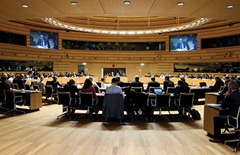European market integration: Sue Harrison seeks local views
 Views from local stakeholders are needed to inform UK energy policy in Europe, DECC’s chief negotiator Sue Harrison told the Northern Ireland Energy Forum. More investment in infrastructure is also needed to make market integration a success.
Views from local stakeholders are needed to inform UK energy policy in Europe, DECC’s chief negotiator Sue Harrison told the Northern Ireland Energy Forum. More investment in infrastructure is also needed to make market integration a success.
Integration in European energy policy means that policy decisions “can’t be taken in total isolation anymore” but Northern Ireland has the opportunity to shape UK policy at an early stage. Sue Harrison, the UK’s lead energy negotiator in Europe, is inviting the local energy sector to influence the UK’s negotiating position by putting forward its views to the Department of Energy and Climate Change (DECC).
The department represents the UK as a whole in EU energy negotiations. Ministerial decisions are taken by ministers in the Transport, Telecommunications and Energy Council. Sue Harrison is DECC’s Head of European Markets and has led for the UK on all EU negotiations on the internal energy market for electricity and gas.
Speaking at the Northern Ireland Energy Forum, Harrison said that she was “very conscious” that she needs input from Northern Ireland to make sure that the final agreement is suitable for the Single Electricity Market (SEM). Having that information allows the UK to intervene at an early stage to get the right results for the particular circumstances of Northern Ireland.
A stakeholder group, jointly chaired by DECC and Ofgem, meets every two to three months, to discuss the technical codes; counterparts from Northern Ireland and the Republic of Ireland are invited to attend these meetings. DECC wants to ensure that messages from meetings taking place within the SEM are communicated to it so that officials can take them into account when developing the UK policy position.
The experience of developing the SEM, in her view, is “very valuable and should be shared with other member states.” Northern Ireland stakeholders therefore can have a “key role” in EU negotiations and she is open to suggestions on improving how the province is represented.
Aims of reform
Heads of government set a “very ambitious target” in February 2011, to complete the internal energy market by 2014. Officials will do as much as they can within that timeframe to achieve “much closer market integration” across electricity and gas sectors. The target model for electricity will be enshrined in technical codes which will be binding across the European Union.
“To enable closer market integration to take place, there’s a clear need for further investment in infrastructure, particularly across borders,” she explained. “Interconnection at the moment is pretty patchy in some places and you do not get proper market integration without much more interconnection.”
The overall aim is to set up a properly working market, where electricity flows according to price signals, interconnection infrastructure is efficiently used and prices converge across the continent. A larger market should also be better placed for facilitating the growth of renewable energy and coping with its intermittency.
Work on the technical codes is mostly being undertaken by system regulators and operators through the Agency for the Cooperation of Energy Regulators (ACER) and the European Network of Transmission System Operators for Electricity (ENTSO-E). The European Commission is overseeing the process.
 Member states do not have a formal role at this stage but are keeping a close eye on developments as they will need to agree the final versions of the codes.
Member states do not have a formal role at this stage but are keeping a close eye on developments as they will need to agree the final versions of the codes.
As a single energy market on this scale has never been attempted before, this is new territory for all those involved. Harrison senses “a real desire to make the process as transparent and inclusive as possible” but she would also welcome any ideas for improving the process.
Negotiations on the Infrastructure Regulation are also under way, with the aim of facilitating investment in the strategic infrastructure projects needed for integration and the low carbon transition. Around 200 projects of common interest in electricity and gas will be selected across the EU and should receive fast-track approval in national planning processes. A lack of agreement on sharing the costs and benefits between member states is a potential barrier to investment.
The Commission has proposed £9.1 billion in financial support over seven years but this will only benefit a small number of projects due to the high costs of infrastructure. The majority of funding will therefore be commercial.
National policy, including electricity market reform in Great Britain, is “becoming increasingly constrained” by EU legislation and the legislation is becoming much more complicated and wide-ranging.
Decisions in one country will naturally have implications for their neighbours, and these effects are much more immediate in continental Europe due to its synchronous grid. Germany, for example, is now aware that its decision to phase out nuclear power by 2022 had unforeseen consequences for some of its neighbouring markets. The lesson is to “talk a lot more with your neighbours so that everybody has the chance to analyse what the potential impact on their markets can be.”
The electricity target model is “very challenging but if we are serious about developing a single market across the EU, it has to be done.” All players in energy need to be fully aware of policy developments at an EU level and become fully involved and engaged in the various forums through which policy can be influenced.
Harrison stated: “The ideal outcome is that we all achieve solutions that really benefit our particular systems. That is easier said than done but that must be the objective.”
The impact of the technical codes on Northern Ireland will be different from the impact on Great Britain. As no single person or organisation has the experience or knowledge to cover all aspects of the codes, it is “extremely important” for the two jurisdictions to work very closely together.
Summing up her key message, Harrison remarked: “I do not want to have to agree something at EU level which turns out to be less than optimum for the situation here.”





